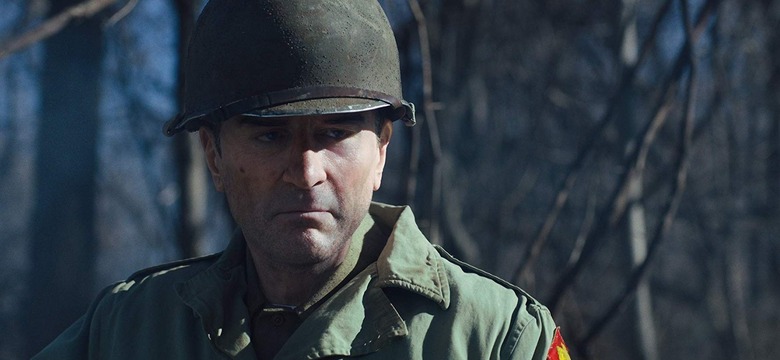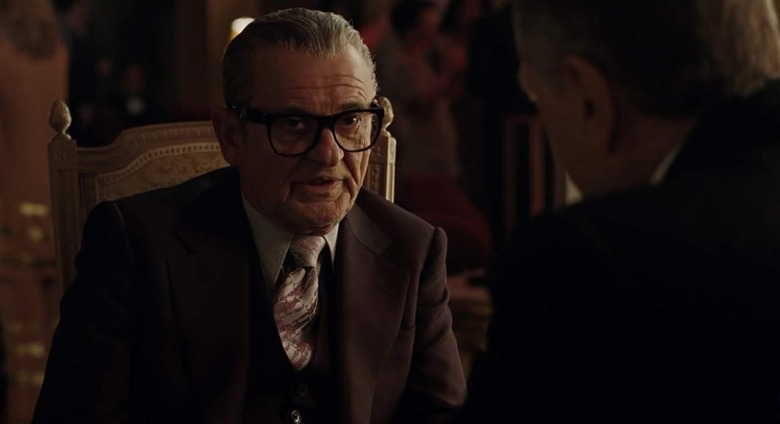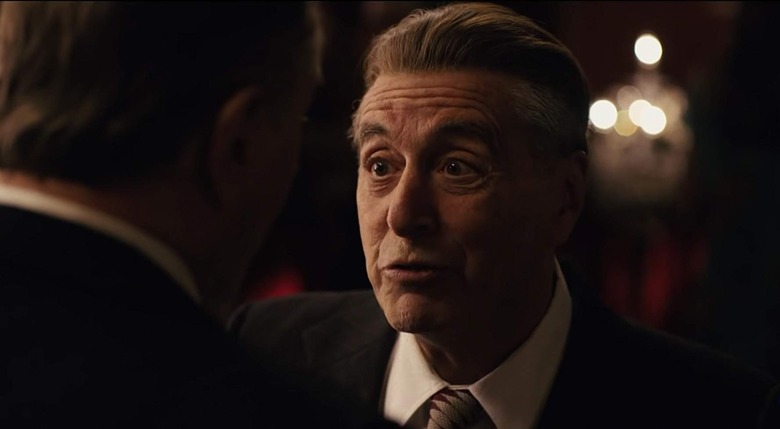How 'The Irishman' Culminates The Greatest Director And Actor Collaboration In Film History
Martin Scorsese's sprawling new mob epic, The Irishman, opens with a tracking shot through a nursing home. We're a long way from the Copacabana in Goodfellas, but that nightclub, too, makes an appearance later, and the shot in question here is still soundtracked by a golden oldie. "In the Still of the Night" takes the place of "Then He Kissed Me." The camera glides past senior citizens with cane walkers to a place where a white-haired old man in tinted glasses sits, looking like a shadow of his former Casino self.
Scorsese's nine-time feature film collaborator, Robert De Niro, plays Frank Sheeran, a war veteran turned trucker turned labor union official turned nostalgic wheelchair occupant who paints himself as a Mafia assassin in flashbacks. That's not the only "painting" we'll see him do, either. "When I was young, I thought house painters painted houses," Sheeran says at the top of his voiceover. Hearing these words in this context, it's not hard to think of Henry Hill in Goodfellas, narrating, "As far back as I can remember, I wanted to be a gangster." In Sheeran's world, it turns out painting houses entails splattering their walls red with people's blood.
Without delving into spoilers beyond the opening shot, it's enough to say that cinephiles versed in the visual language of Scorsese's films will be able to pinpoint many such callbacks when The Irishman hits Netflix on November 27 (it's playing in limited theatrical release right now). Among other things, the movie serves as the summation of cinema's greatest director-and-actor collaboration. Critics have described it in almost oxymoronic terms, calling it "a bold and shattering epic of old age." Beyond the hype lies a film about human frailty, with one foot in the grave and one foot in the almighty past.
De Niro's Ride on the Leading-Man Carousel
Throughout his career, Scorsese has paired himself with actors the way a serial monogamist might choose life partners. First, there was Harvey Keitel, who starred in Scorsese's 1967 feature film debut, Who's That Knocking on My Door. Keitel remained a looming presence in Scorsese's films through Mean Streets, Alice Doesn't Live Here Any More, Taxi Driver, and The Last Temptation of Christ. In The Irishman, he's back in a small role, along with some faces from Scorsese's erstwhile HBO shows, Vinyl and Boardwalk Empire. Ray Romano, Bobby Cannavale, Stephen Graham, and Jack Huston all make appearances.
Going back to Mean Streets, that's the film that began Scorsese's long, fruitful collaboration with De Niro. In terms of sheer greatness and "historical, aesthetic significance," as the National Film Registry would call it, that 46-year collaboration remains unparalleled in the annals of cinema, from past to present. Off the top of my head, the only names that come to mind for a director-and-actor partnership that could possibly give Scorsese and De Niro a run for their money would be Akira Kurosawa and Toshiro Mifune.
1973 was a breakout year for De Niro and while he initially played second fiddle to Keitel, Taxi Driver shifted the balance to him as Scorsese's new de facto leading man. At that time, De Niro was choosier about his roles, or maybe he was just getting better offers because of his youthful talent and dedication to his craft. By all accounts, going to the theater to see a new Robert De Niro movie circa the 1970s was a true event.
It wasn't just his Scorsese collaborations; there were also great American films like The Godfather, Part II and The Deer Hunter. Even when I was coming of age as a filmgoer in the 1990s, De Niro still held a reputation as his generation's finest actor. Raging Bull and Cape Fear netted him Oscar nominations for Best Actor (for the former, he won); The King of Comedy would go on to influence this year's Joker; and Goodfellas and Casino repositioned him as the elder statesman of mob movies. However, 1995 was probably the last great year in De Niro's career.
Fans of Jackie Brown and Wag the Dog might make a case for 1997 being that year, but Casino and Heat, De Niro's two 1995 releases, had more of an epic quality to them and they both utilized him as a legit lead or co-lead. Casino also marked the end of his collaboration with Scorsese for many years. In the 2000s, Scorsese changed partners, taking on a new, younger leading man for his movies. The box office appeal of Leonardo DiCaprio helped him get his long-brewing period piece, Gangs of New York, up off the snowy ground and into the blood-drenched Battle of the Five Points. From there, Scorsese and DiCaprio were off to the races. In eleven years, they cranked out five movies together, the most recent being The Wolf of Wall Street in 2013.
The Power of Pesci, De Niro's Ace Wingman
The Irishman sees Joe Pesci coming out of retirement to re-team with Scorsese and De Niro for the fourth time. Over the years, De Niro and Pesci's onscreen dynamic has evolved. Pesci was an unknown when he portrayed Joey LaMotta, the brother and manager of De Niro's self-destructive boxer, Jake, in Raging Bull. In that movie, he was very much there in a supporting capacity: Joey took a beating at Jake's hands and their estrangement helped precipitate Jake's decline. Pesci's performance earned him his first Oscar nomination for Best Supporting Actor.
Ten years later, he would win the award for his career-defining role as the volatile gangster Tommy DeVito in Goodfellas. That character started out as a juvenile delinquent, played by a younger actor, not Pesci. (The Irishman arguably would have been better served going that route, too, with its digitally de-aged flashback scenes). De Niro's Jimmy "The Gent" Conway had seniority over Tommy and he put him to work fencing stolen goods. By the end, Pesci, as Tommy, would be ready to come into his own as a "made man" in the Mafia, but we'd have to wait for Scorsese's next mob movie to see that happen.
Indeed, Goodfellas wouldn't be the last time Pesci played a violent hothead for Scorsese. It's part of the reason he retired from acting: because he was so good in Goodfellas that he faced typecasting in Hollywood. Casino put Pesci on more equal footing with De Niro, as his new character, mob enforcer Nicky Santoro, went about crushing heads in vices (instead of pistol-whipping them or shooting them, like Tommy). Nicky fulfilled the "made man" promise of Tommy, which greatly complicated the love triangle between him, De Niro's casino exec, Ace Rothstein, and Ace's wife, Ginger, played by Sharon Stone.
In The Irishman, Pesci returns as a kinder, gentler mafioso named Russell Buffalino. Now, he's a full-on mob boss who wears the weight of time in the lines on his face and in the newfound mellowness of his character's personality. Russell is the type of guy who will come to the aid of strangers, helping Sheeran fix his engine at a truck stop. There's only a hint of the old violence there when he comes home to his wife one night in a blood-stained shirt.
De Niro has kept in front of the camera all these years, but outside the occasional cameo or independent film, this will be the first time most viewers have seen Pesci appear in a major motion picture since the late 1990s. His face has lived young in all these old movies but now it's back and it's aged visibly. This gives Pesci's performance a raw emotional charge and helps shape it into The Irishman's most constant, palpable asset. It feels more heartfelt, somehow, than any of the other performances because we know this isn't just another acting gig for him.
Hoo-Ha! Pacino’s Back Onscreen with De Niro
Seeing Pesci play a more level-headed supporting character again brings us full circle to Raging Bull and frees up space for Pacino to do what he does best: namely, go big, personality-wise. Hoffa is the showier role, which means it's firmly in Pacino's wheelhouse. Bursts of bombast like, "Hoo-ha!" feel truer to Pacino's imprint now than the stone-faced Michael Corleone of the 1970s. As others have pointed out, "Shouty Al" has unleashed his fair share of "mighty apoplexies" over the years.
In The Irishman, Pacino even spins out rhymes as Hoffa: "If you got it, a truck brought it," and, "Charge with a gun; with a knife, you run." There's a scene where Hoffa works himself up into a fit of speechless rage, while the camera lingers on him indulgently, as if to say, "Do your thing, Al." The movie starts to drag in its first long stretch before Pacino shows up onscreen, but when he does, he adds a spark of life to it that helps carry it to the finish line. Hoffa's Achilles heel is his stubbornness, his inability to listen to reason. He doesn't suffer fools gladly, but he's so hellbent on keeping his power within the Teamsters union that his own actions become foolish and even life-threatening.
There was a time when it was a big, big deal to see De Niro and Pacino, these two living legends, sit across from each other in a movie. They were both in The Godfather, Part II, but they never shared an actual scene together until 1995 when worlds collided in a combustible mix of movie talent and they co-starred in Heat. If the Internet were as widespread, back then, as it is now, their diner summit in Heat would have broken it.
As it is, their star power has waned in the intervening years, and their subsequent appearance as buddy cops in the forgettable 2008 thriller Righteous Kill somewhat dulled the impact of seeing them exchange dialogue. In The Irishman, the De Niro/Pacino reunion really ranks as more of an afterthought. At one point, we see them literally riding in the backseat of a car together ... whereas De Niro and Pesci are shown riding up front. That's as it should be.
The Irishman is a flawed film about flawed men, which means it's hardly unique in Scorsese's filmography or in the greater overarching representation system that is Hollywood history. It's too soon to tell (and I'm probably not the right referee to make the call) whether this movie seeks to uphold Tinseltown's traditional, patriarchal power structure and/or eulogize it as it collapses en route to the 2020s. What is clear, if nothing else, is that The Irishman ranks as an important footnote in all of that. At-home viewers will soon be able to decide for themselves whether this film truly belongs on best-of lists in 2019, but if you have any knowledge of film history, one thing is clear: The Irishman submits itself as a crooning swan song for the single greatest director and actor collaboration of the 20th century.



